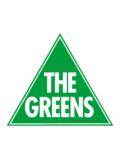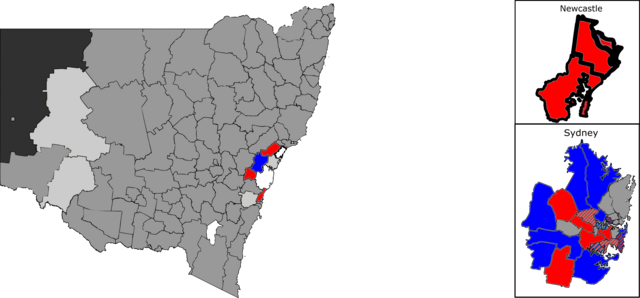Top Qs
Timeline
Chat
Perspective
2021 New South Wales local elections
From Wikipedia, the free encyclopedia
Remove ads
The 2021 New South Wales local elections were held on 4 December 2021 to elect the councils of 121 of the 128 local government areas (LGAs) in New South Wales. Several councils also held mayoral elections and/or referendums.[1]
Previous referendums took three net councillors in three LGAS: Cabonne, Coonamble and Dungog.
The Liberal Party did not run in Kiama, North Sydney or Shoalhaven, however a number of party members chose to contest as independents.[2]
Remove ads
Background
Summarize
Perspective
Following the 2012 elections, the Local Government (Areas) Act 1948 was introduced, leading to the amalgamations and mergers of a number of councils. This resulted in 79 councils being contested in 2016 and 46 2017. 2021 marked the first time in 9 years that the vast majority of councils were being contested at the same time.
The elections were scheduled to be held in September 2020, but as a result of the COVID-19 pandemic in Australia they were delayed until 4 September 2021. On 24 July 2021, it was announced the elections would again be delayed until 4 December 2021.[3]
Two councils − Fairfield and Penrith − opted to use the services of the Australian Election Company, while all other elections were conducted by the New South Wales Electoral Commission.[4]
The election for Norfolk Island Regional Council, which was meant to be held at the same time as New South Wales, was also postponed in 2020. It was later scheduled to be held in March 2021, however the council was suspended in February 2021 and eventually dismissed on 6 December 2021.[5]
Lead Greens candidate for Orange, Melanie McDonell, announced on 21 May 2021 she would leave the Greens and stand on a "McDonell Team" independent ticket.[6]
Remove ads
Political parties
The following registered parties contested the elections. This does not include unregistered groups of independents:
- Animal Justice Party
- Greens
- Labor Party
- Liberal Democrats
- Liberal Party
- Shooters, Fishers and Farmers Party
- Socialist Alliance
- Sustainable Australia Party
- The Small Business Party
In addition, a number of local government-registered parties also contested the elections.[7]
Party changes before elections
Summarize
Perspective
A number of councillors joined or left parties before the 2021 elections.
Remove ads
Results
Council totals
Remove ads
Referendums and polls
Summarize
Perspective
In addition to the local elections, eight LGAs held referendums on questions relating to electoral structures. An advisory poll on de-amalgamation was also held for Inner West.
The closest result was in Wagga Wagga, where 50.6% voted "No" to directly-electing the mayor.
Remove ads
Aftermath
Elected councillors
Logan Collins was elected to Cootamundra–Gundagai Regional Council at the age of 18, becoming the youngest local councillor in New South Wales history.[24][25]
iVote crash and re-runs
Analysis commissioned by the NSWEC found 55 voters in Singleton, 54 in Shellharbour and 34 voters in Kempsey who attempted to use iVote were prevented from casting their vote.[26] As a result, re-runs were ordered by the Supreme Court of NSW which were held on 30 July 2022 and iVote was not used for the 2023 state election.
Remove ads
By-elections and countbacks
Summarize
Perspective
The New South Wales Electoral Commission has held a number of by-elections and countbacks to fill vacancies on councils since the 2021 elections.[27]
Countbacks were introduced in January 2022 for council vacancies across the state, although by-elections are still used for some councils.[28]
By-elections
Countbacks
Remove ads
Notes
- Excluding directly-elected mayors.
- Including local groups (not to be confused with locally-registered political parties, which are counted here in the "Others" column).
References
Wikiwand - on
Seamless Wikipedia browsing. On steroids.
Remove ads






